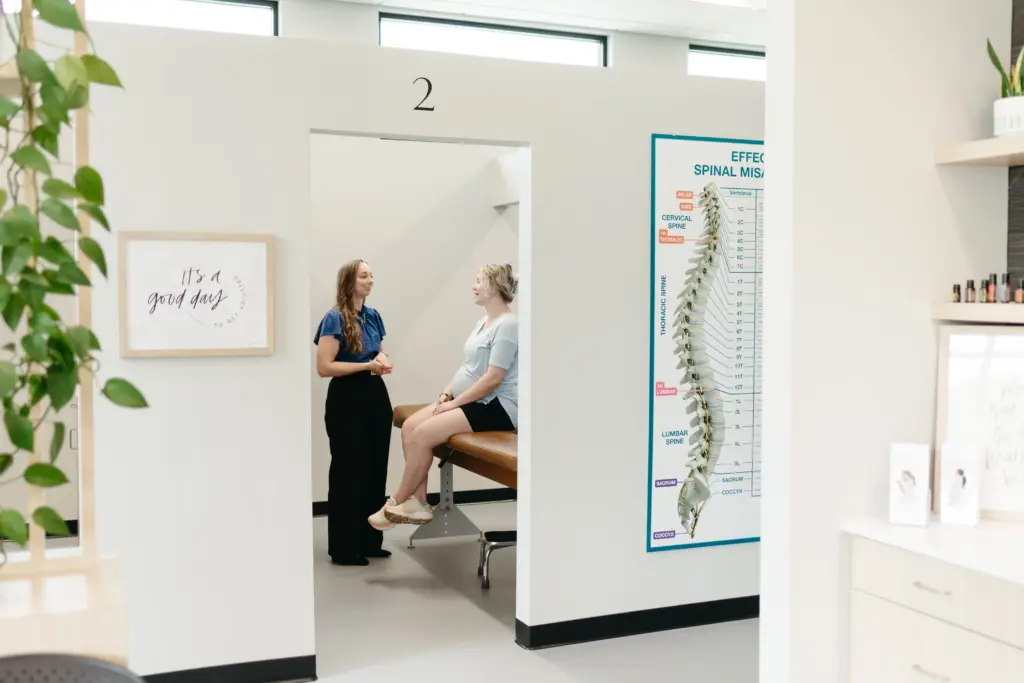Your spine is the backbone of your body’s structure and nervous system. It supports your weight, provides flexibility, and protects the spinal cord, which connects your brain to every part of your body. However, like any crucial part of the body, the spine can undergo wear and tear over time, a process known as spinal degeneration. If left untreated, spinal degeneration can impact your daily life by causing pain, reduced mobility, and other health issues.
At Thrive Family Chiropractic Urbandale, IA, we believe that understanding the phases of spinal degeneration is essential for early detection and effective treatment. Early intervention with a trusted Urbandale chiropractor can help preserve spinal health and improve quality of life for years to come. In this blog, we will explain the phases of spinal degeneration, warning signs to watch for, and how chiropractic care can help.
What is Spinal Degeneration?
Spinal degeneration refers to the gradual deterioration of the spinal structures, including bones (vertebrae), intervertebral discs, ligaments, and joints. This condition is often age-related but can be accelerated by factors such as poor posture, injury, repetitive stress, or underlying health problems.
The spine consists of 33 vertebrae stacked one on top of another with cushioning discs in between. These discs act as shock absorbers and allow flexibility. Over time, these discs and other spinal components may degenerate, leading to decreased function and pain.
The Four Phases of Spinal Degeneration
Spinal degeneration typically progresses through four distinct phases. Understanding these can help you recognize early symptoms and seek timely care.
Phase 1: Dysfunction Phase
- Description: This initial phase involves minor changes in spinal function without significant structural damage.
- What Happens? Ligaments and muscles supporting the spine may become overstretched or weak. Small misalignments (subluxations) can develop.
- Symptoms: Often subtle or absent. You may experience mild stiffness or occasional discomfort.
- Why It Matters: Dysfunction in this stage is reversible with proper care and lifestyle changes. Early chiropractic intervention can restore normal function.
Phase 2: Instability Phase
- Description: As degeneration progresses, spinal segments can lose stability due to ligament laxity and disc weakening.
- What Happens? Vertebrae may move excessively or improperly during motion. Discs begin to lose height and elasticity.
- Symptoms: Increased stiffness, intermittent pain, muscle spasms, or nerve irritation may appear.
- Why It Matters: Instability increases wear on joints and discs. Without treatment, degeneration accelerates.
Phase 3: Stabilization Phase
- Description: The body attempts to stabilize the unstable segments by forming bone spurs (osteophytes) and thickening ligaments.
- What Happens? These bony growths reduce excessive movement but can impinge on nerves or restrict motion.
- Symptoms: Chronic pain, reduced range of motion, numbness or tingling in limbs due to nerve compression.
- Why It Matters: Although some stability returns, symptoms often worsen. Chiropractic care combined with other therapies can help manage symptoms.
Phase 4: Spinal Fusion Phase
- Description: In the final phase, the affected vertebrae may fuse naturally due to extensive bone growth and tissue changes.
- What Happens? Fusion limits movement completely in the affected segment.
- Symptoms: Stiffness becomes severe; chronic pain may persist; nerve-related symptoms can continue.
- Why It Matters: Fusion stabilizes the spine but reduces flexibility. Focus shifts to managing pain and preserving function in other areas.
Common Causes and Risk Factors of Spinal Degeneration
Several factors contribute to the development and progression of spinal degeneration:
- Age: Natural wear and tear increase with age.
- Poor Posture: Sitting or standing improperly strains spinal structures.
- Repetitive Stress: Jobs or activities involving heavy lifting or twisting.
- Injury: Trauma from accidents or falls can accelerate degeneration.
- Genetics: Some people are predisposed to early degeneration.
- Obesity: Extra weight puts more stress on the spine.
- Lack of Exercise: Weak muscles provide less support for spinal alignment.
Warning Signs That You May Have Spinal Degeneration
Early detection is key to preventing further damage. Watch for these signs:
- Persistent back or neck pain that worsens over time.
- Stiffness or decreased flexibility in your spine.
- Radiating pain, numbness, or tingling in arms or legs.
- Muscle weakness or spasms.
- Difficulty standing or walking for long periods.
- Loss of height or noticeable changes in posture.
If you experience any of these symptoms regularly, it’s important to consult a healthcare professional like a chiropractor for evaluation.
How Thrive Family Chiropractic Urbandale Can Help
Chiropractic care plays a crucial role in managing spinal degeneration at every phase. Here’s how our team at Thrive Family Chiropractic Urbandale, IA supports your spinal health:
Early Detection and Assessment
We perform thorough examinations using advanced techniques to identify signs of spinal dysfunction or degeneration early on—even before severe symptoms arise.
Customized Treatment Plans
Our chiropractors create personalized treatment plans based on your condition’s phase and severity. Treatments may include:
- Spinal Adjustments: Gentle realignment of vertebrae restores proper motion and reduces nerve interference.
- Soft Tissue Therapy: Techniques like massage reduce muscle tension and improve circulation.
- Rehabilitation Exercises: Strengthening and stretching exercises support spinal stability.
- Posture Correction: Advice on ergonomics and daily habits prevents further strain.
- Lifestyle Counseling: Nutritional guidance and activity modifications promote overall spine health.
Pain Management Without Drugs or Surgery
Chiropractic care offers a natural alternative for pain relief without relying on medications that may have side effects or invasive surgeries with longer recovery times.
Long-Term Wellness Focus
We emphasize preventative care aimed at maintaining your spine’s health to avoid progression into later phases of degeneration.
Patient Success Story from Urbandale
One of our patients, a 45-year-old office worker from Urbandale, came to Thrive Family Chiropractic with chronic neck and back pain limiting her daily activities. After an initial assessment revealed early-phase spinal degeneration aggravated by poor posture at work, we developed a tailored treatment plan including regular adjustments and posture education.
Within a few weeks, she reported significant pain relief, better mobility, and improved energy levels. Ongoing care has helped her maintain these improvements and prevented further degeneration.
Tips to Protect Your Spine at Home
Alongside chiropractic care, adopting healthy habits supports long-term spinal health:
- Maintain Good Posture: Sit upright with shoulders relaxed; avoid slouching.
- Stay Active: Regular low-impact exercise like walking or swimming strengthens muscles around the spine.
- Lift Properly: Use your legs instead of your back when lifting heavy objects.
- Use Ergonomic Furniture: Support your back at work with chairs designed for spinal alignment.
- Maintain Healthy Weight: Reduces stress on spinal joints.
- Stay Hydrated: Water helps keep spinal discs healthy.
When to See a Chiropractor in Urbandale, IA
If you live in Urbandale or nearby Des Moines and notice signs of spinal discomfort—whether mild stiffness or chronic pain—it’s wise to get evaluated early. Early intervention can slow or reverse degeneration’s course.
At Thrive Family Chiropractic Urbandale, IA, our experienced team offers comprehensive assessments and gentle treatments tailored to your needs. We focus on preserving your spine’s function so you can enjoy an active lifestyle free from pain.
Conclusion
Spinal degeneration is a progressive condition that affects many people as they age but does not have to control your life. Understanding its phases helps you recognize changes early and take proactive steps toward care.
Whether you’re experiencing minor discomfort or more advanced symptoms, chiropractic care at Thrive Family Chiropractic Urbandale, IA offers effective solutions tailored for every stage. Our goal is to help you maintain a healthy spine and nervous system so you can enjoy your daily activities without limitations.
Don’t wait until spinal degeneration worsens—schedule a consultation with Thrive Family Chiropractic Urbandale today and take the first step toward preserving your spinal health for the long term.




